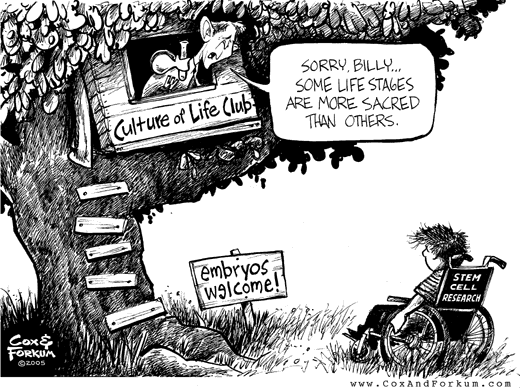First of all, welcome to my new blog! This site is dedicated to the discussion of the current public issue: Embryonic Stem Cell Research. Now lets get started.
Over the past few years, stem cell research has received star power from famous celebrities such as actor Michael J. Fox and the infamous boxer Muhammad Ali. Both men suffer from Parkinson's disease which is on the long list of medical conditions which could possibly be cured with further research of embryonic stem cells. Michael J. Fox did an interview with George Stephanopoulos . The dialogue helps to explain the point-of-view of someone with hope, someone who has something to gain from the testing being done with these cells. Mr. Fox explains the trade-offs he makes in his daily life and some of the criticism he must endure because of his strong stance. For me it is really important that as this blog develops, the focus is not just on the research being done and the science but also how the research and restrictions around it affect people, how all of this will or will not be applied to daily life. Anyone, from individuals like Mr. Fox and Mr. Ali who have everything to gain, to someone who believes that by conducting this research you are performing murder, every person’s voice matters. In the end it is not what actually happens that will make the last impact decades from now, but how people perceive what happened that will make the difference. For example if the masses were to view research that breaks the embryonic stem cell, not as murder but as being one step closer to saving hundreds of thousands of other lives, the outlook becomes positive versus someone viewing the same situation as committing murder for the possible off chance that maybe that small minute group of cells may be a step in finding a cure for some medical condition depending on what is stumbled upon. I look forward to people reading and writing back to me so we can discuss the personal impact of this issue along with morals and science for the latter two can be discussed until the text turns blue!

5 comments:
Interesting thoughts. Unfortunately we can't find out just what the stem cells can cure until more funding is allocated for research. I know that mice are similar to humans in the body somewhat, and there have been several successes with implanting stem cells on mice to do some amazing things. Just imagine what stem cells could do for humans.
This is good stuff. I agree with jatate because there are so many ways that this kind of research could potentially benefit humans in the not-so-distant future. Yes, the research of stem cells must start with taking the cells from an aborted fetus. However, the fact is that as of now abortion is a legal process and why not just use those cells for potential benefit. If abortion was illegal I would have to say that it is wrong; but while it is still a legal process these cells are just going to waste. Further research would tell scientists whether it is a beneficial process. So why not attempt?
Angilman makes a good point, if the means for research are available they shouldn't go to waste. The gains that can be made from studies could and have helped researchers to make break through discoveries. In the case of organ donors for example, the resources are there to enable us to benefit one individual without harming another. Opportunities like this should be utilized. Since stems cells are not fully developed cells, the potential ability to determine what cell will be formed could reduce the need for alternatives such as organ donors. The new capability would serve to decrease or eliminate altogether the time a patient has to wait for a donor.
Embryonic stem cell research is definitely still in its infancy as a scientific study. However, adult stem cells have about a twenty year head start and have been used in humans as a last resort for heart diseases as seen on www.theravitae.com. The set back lies in the fact that the procedure is only being performed in a few places internationally not in the USA. The element of international travel for medical attention adds an additional and very important risk because medical standards and conditions are not always held to the same standards as they are here in the USA.
Angilman - You make a great point, some cells used for research would have served no purpose otherwise. Why not use them for productive research if they just would have been destroyed with no purpose otherwise. Healthygirl also brings up the point that by developing and understanding stem cells uses and the required technology to apply this knowledge, the long lists for organ donors and transplant patients could be significantly shorter. Although this concept is much farther in the future because of the current restrictions on embryonic stem cell research. http://www.whitehouse.gov/news/releases/2001/08/20010809-1.html. Just about any medical condition that deals with the destruction or removal of cells can be replaced and rebuilt with embryonic stem cells which are essentially blank cells that can develop into any of the over 220 different cells on the human body.
Post a Comment